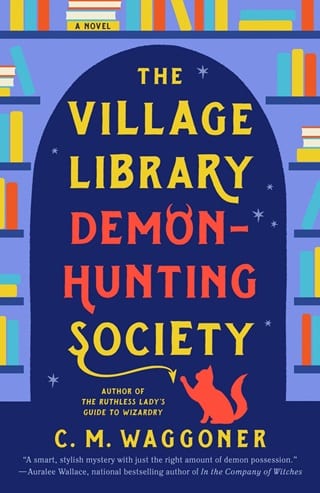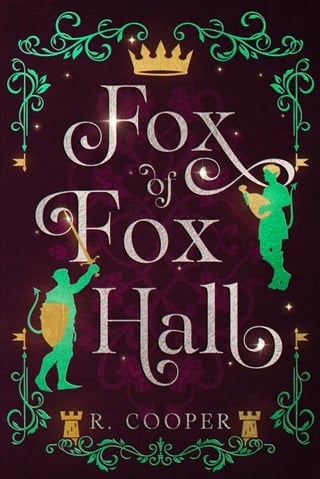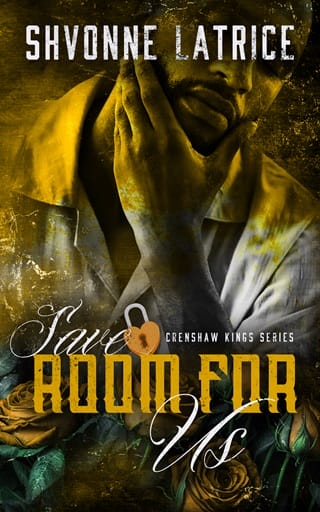Chapter Fourteen
Fourteen
Sherry slammed on the brakes instinctively when she saw the body, and there was a horrible, heart-stopping moment when the car skidded out before rolling to a stop a few inches from the drainage ditch. A moment after the car stopped moving, there was a terrible, creaking groan, and a massive oak tree came crashing down across the road just a foot or so in front of Janine's car, some of the branches close enough to brush against the windshield. Sherry just sat there in the car for a few moments, her heart pounding and her brain taking up a nasty, spiteful chant. It happened because you got in the car, you shouldn't have done it, you shouldn't have done it. You lost the right to drive yourself. This is payback for what you did. An iced-over twig from the tree dragged itself back and forth across the windshield with a soft hiss.
She took a few deep breaths. Then she turned the car off and got out to look for the body. There was nothing there, nothing at all where she'd seen it lying just a few moments before. She squatted down to try to peer under the tree, on the stray, awful chance that the body had been flattened underneath it. Nothing. Then she peered into the woods, with the vague notion that there might be someone out there, someone who'd dragged the body out of the road or made the tree fall down to cover it. Some sort of top-hatted villain holding a saw and cackling. There was nobody, though. Just snow, and ice, and then, out of the corner of her eye, movement. She turned to look. A man. Alan.
It couldn't be him. It wasn't possible. It was him. He wasn't dressed the way he'd been the night he'd died. He was wearing the outfit he'd worn when they'd gone snowshoeing together last winter, bundled up in a big puffy jacket and waterproof pants with thick, woolly socks pulled up over the cuffs, like a little boy whose mother had sent him out to go play in the snow. His face was pink from the cold. There were icicles in his mustache. She'd laughed at that, last time. He'd had to break them off before they went inside for hot chocolate.
"Sherry," he said. "You can't leave town."
He didn't sound like a ghost. He wasn't wailing and moaning. He just sounded like Alan. Kind, gentle. Maybe a little tired.
"Hi, Alan," she said. Her throat had gone tight. "I really miss you. I wanted to go to the library in Schenectady to see if I could find out anything about your old cases. How come you never told me that you were a public defender?"
He just shook his head. "You can't go, Sherry. You have to stay in town."
"But why ?" Sherry asked, wanting Alan to help her, to explain what was going on, even though she knew , rationally, that this wasn't Alan. This couldn't be Alan. Either this was another trick from whatever…force was causing all the strange things to happen in town, or she was losing her mind. Or both. Maybe all of this had been in her imagination. Maybe she was the evil thing that had come to Winesap.
"You just can't ," Alan said, but even as he spoke, his face was shifting, changing, the mustache fading away, his whole body growing shorter and wider, a double chin ballooning under his face, his eyes turning pale and suspicious, his blue beanie transformed into a big floppy velvet thing, until—
"Oh, no ," Sherry said. " Go away. Leave me alone!"
"I wouldn't have to appear if you would only do as you're told, woman," Lord Thomas Cromwell said. "It isn't in the spirit of the thing for you to leave the field before the tourney has been completed. She won't allow it."
"What a stupid metaphor," Sherry said. "I really wish I could have imagined a better ghost to bother me all the time. You talk like a twelfth grader is playing you at a seasonal haunted house. I'll bet that hat was rented from a costume warehouse."
He sputtered at her for a moment, which she found satisfying. She knew that she shouldn't antagonize him, but in this particular moment it felt like the only thing in the world that she was capable of actually doing right.
"You're a fractious, hardheaded creature," he said. "And you won't leave this place before she's had her satisfaction." His expression shifted then. He looked her in the eye. "She's a stronger thing than either of us, and she likes her game to be played by the rules. You'd best stop trying to bend them, before you risk worse than a fright on a country road." Then he vanished, all at once, and the winter silence filled in the space where he'd been.
Sherry got back into the car, where she shivered pathetically for a while before it occurred to her that she would be less cold if she turned the engine on. She did that. Then, eventually, she managed to convince herself to turn around and drive back toward town. To the grocery store. She had promised to do Janine's grocery shopping.
She made her way systematically through the grocery store, back and forth through every single aisle, picking up everything on Janine's list as she came to it without trying to rush straight to it. It was nice. Comforting. She liked looking at all the colorful packages lined up in orderly rows on the shelves. She liked watching the nice young couple in the spice section trying to decide whether it would be better to buy a jar of mixed Italian herbs or to get the basil and oregano separately. She liked the terrible music piped in through the speakers. When she checked out, the youth and disinterested politeness of the pimply teenager at the register nearly made her cry. It would be nice, she thought, to be a pimply teenage girl who worked at a supermarket and hadn't yet had the chance to do a dozen things that she would regret for the next thirty years.
She drove back to Janine's house, parked, and carried the groceries to Janine's porch. When Janine answered the door, she looked baffled. "Sherry? What are you doing back already? I thought you were going to Schenectady."
"I couldn't," Sherry said. "There was a body in the road."
Janine blanched. "Oh my God. A body ? Whose body? Did you call the police?"
"It disappeared," Sherry said. It felt as if her mouth was doing the talking without her consent. "Then a giant tree fell across the road."
"What?" Janine said. "Sherry— what? "
A hysterical little giggle bubbled up out of Sherry's chest. "Alan's ghost appeared and started telling me that I couldn't leave town," she said. "Then he turned into the ghost of Lord Thomas Cromwell. He's insufferable ."
"Sherry," Janine said, and took the bags of groceries from her. She was frowning. "I think you should come in and sit down."
Sherry followed her inside, obedient, and sat placidly on Janine's expensive cream-colored sofa to wait for her to finish up in the kitchen. She didn't think about anything in particular, just soaked in the comfort of sitting in a nice, tidy, well-appointed room with no ghosts or demons evident. Then Janine appeared again, with a lovely tray with tea and teacups and chocolate chip cookies, and after she'd settled in with everything and Sherry had had her first sip of tea, she looked at Sherry over the rim of her own cup and said, with enormous seriousness, "I'm afraid that you're losing it."
Sherry choked on her tea, which was unfortunate, because it was some of Janine's very fancy Russian Caravan that she stocked up on once a year at that expensive little shop in Manhattan. When she'd finished hacking, she said, "Is that your professional opinion?"
"No," Janine said. "It's just my unprofessional opinion as your best friend that I think you're stressed-out and mourning your boyfriend, and that you're losing it a little. I think you need to get out of Winesap for a while, Sherry. My friend Kathy has that little place in Key West that I told you about, and it's just standing empty right now. I'm sure she'd let you stay there for a few weeks."
"Key West," Sherry repeated. It sounded insane. Like Janine was proposing that she climb into a rocket ship and head to her vacation home on Neptune. "How am I supposed to make it to Key West when I can't go to Schenectady ?"
Janine made a face. It was subtle, but definitely a face . Then she smoothed out that expression like someone running a spatula over a badly frosted cake. "I don't know that you can't go to Schenectady, Sherry."
Sherry didn't think of herself as a person who got angry easily. The opposite, really. She'd put up with a lot before she got angry. She was angry now, though, in a sudden hot rush that felt more exciting than unpleasant or uncomfortable. There was a sort of power in feeling righteously outraged. "I know that I can't," she said. "I know what happened to me. I know what I saw. And I think that you're being ridiculous. You're so scared of admitting that something strange is going on that you won't admit that something strange is going on . I'm not crazy , Janine."
Janine was holding her hands in the air. "Sherry," she said. She kept using Sherry's name over and over in that infuriating way. They probably taught them to do that in therapist school. "I don't think that you're crazy. I promise that I don't think that you're crazy." The way that she was holding her hands up as if she expected Sherry to reach out and smack her only made Sherry angrier. She'd never hit anyone in her life.
"That's just semantics , though, isn't it?" she said. "You probably say that to all of the crazy people because it's offensive to call people crazy. I don't want you to say that you don't think I'm crazy, I want you to take me seriously . And stop acting like you think I'm going to hit you!"
Janine sighed and folded her hands in her lap with what looked like a certain amount of conscious effort. "I promise that I'm taking you seriously," she said. "I'm not talking about how crazy you are behind your back. I believe that you've been experiencing things that you can't explain. It's just hard . You understand, don't you? Haven't you ever tried very hard to believe in something but not been able to believe in it, anyway?"
It was exactly the thing to say to smack Sherry's rising dudgeon right back down into the dirt. "I went to Catholic school," she said after a moment. "For a while I couldn't believe but still thought I was going to go to hell for not believing. I used to pray to a God I couldn't believe in to make me believe in him. I wanted to believe. But now I'm starting to believe in all kinds of things that I don't want to believe in at all. As soon as you start believing in demons and things, then you have to worry about them coming after you. And they are . I swear that they are. They won't leave me alone ."
Janine didn't say anything. She just leaned forward, took Sherry's hand in hers, and gave it a gentle squeeze.
Sherry burst into tears.
She stayed there for a while longer, letting Janine hold her hand and pat her knee and feed her cookies and comfort. Then she left, trudging back up through the snow to her lonely, haunted house. She was beginning to hate being alone in her own home. She hated that she hated it. Lord Thomas came to wind around her ankles and purr. She eyed him suspiciously and hated that she felt suspicious of a creature who lived in fear of the vacuum cleaner. She gave a sudden, furious scream into the quiet of the house, as loudly as she could for as long as she could. When she was finished she didn't feel any better. She just felt like a very silly woman with a sore throat. Lord Thomas, the poor thing, who seemed as if he really was just a cat again at the moment, was hiding under the sofa in a state of fairly reasonable terror.
The screaming having not worked to make Sherry feel any better, she resolved to do some sleuthing instead. So she couldn't go to Schenectady. Fine. She could still get things done. She poured herself a big glass of bourbon and put on a strange old record of Gregorian chants she'd bought at a yard sale a few years earlier, on the theory that it might remind Thomas Cromwell of Thomas More and keep him hiding under the sofa for a bit longer out of remorse.
It was strange. She'd never particularly liked Gregorian chants—did anyone? She supposed that someone must, and they probably threw extremely strange dinner parties—but the sound of them now seemed to soothe her into a sort of trance. She found herself going to the table where she'd abandoned the yew branch, picking the branch up, and carrying it to the kitchen table with her bourbon. Then she fetched the sharpest paring knife in the kitchen and set to whittling. It was nice. Meditative. She drank her bourbon. She prayed. Not any prayer in particular, just half-formed thoughts and phrases that tumbled around and around in her brain— I believe, world without end, have mercy on us, now until the hour of our death, deliver us from evil . At the last phrase she felt herself, as if from a distance, shiver. "Deliver us from evil," she said aloud. Then: "Deliver us." She didn't know whom she was speaking to. To the God she'd prayed to as a child, maybe. Maybe to someone else. Hear me, protect us, deliver us. The chanting rose around her like a warm blanket. "Protect us," she said, as the wood took shape under her hands. She'd had to cut away a lot of the branch for being too thin and whippy to be useful. It still didn't look like much of a stake. It was only about the size and shape of a chopstick. A very sharp chopstick. It would have to work. The chanting was still playing. She went to the shopping bag that held all the things she'd bought in the New Age shop and pulled out something she'd bought on impulse. Now she thought that maybe it had the right sort of resonance. Oil of frankincense. She rubbed it into the wood. "Protect us," she said aloud. "Deliver us." The smell of it was heady. For a moment she felt as if there were other people in the room, gathering around her, sitting by her side, kneeling. Then the record ended. Sherry blinked. Her little weapon sat on her kitchen table, looking like nothing but a bit of scrap wood you'd find in someone's shed. It looked like that, but it looked like more than that, too. Sherry stared at it. She let herself see that it gleamed.
"Thank you," she said aloud, and lifted it to kiss it. She didn't let herself feel silly. She carried it in both hands to tuck it carefully into her coat pocket. Then she sat again and gulped down the rest of her bourbon. The sudden silence was oppressive. There was the quiet of the very early morning in the room, even though it was only about three in the afternoon. She double-checked the time. Early enough to get more work done, and the need to get work done was the excuse she needed to justify how desperately she wanted to hear another human voice right now. She took a deep, steadying breath, trying to shake off the strangeness of the last hour. Then she called up one of her favorite regular library patrons.
Lois picked up on the second ring, as brisk and alert-sounding as ever. "Feldman residence, Lois speaking!"
"Hi, Louie," Sherry said. Lois was Louie to her friends and had bestowed this honor upon Sherry a year earlier, after a spirited chat on the relative merits of Ian Rankin versus Patricia Cornwell. Louie was almost ninety years old, preferred her detectives hard-boiled, and was the chief editor—and only full-time reporter—of the Winesap Herald . She refused to retire on the grounds that if she did, no one else would be willing to run a newspaper in a little town like Winesap, which Sherry had to admit was probably an accurate assessment of the case. "It's Sherry Pinkwhistle."
"Oh, Sherry!" Lois said. "I'm so sorry for your loss. Did you get the flowers?"
"I think so," Sherry said vaguely. There were flowers piling up in her entryway: she'd just been bringing them in off the porch whenever she saw them. There might also be a casserole or two out there. It was a wonder that Lord Thomas hadn't eaten one of them and gotten sick all over the living room rug. "Thank you, it was very kind of you." There must, she thought, be an appropriate and delicate segue between receiving condolences over her boyfriend's—even if he hadn't really been her boyfriend—death and making indelicate inquiries about him. If there was, she wasn't a sensitive enough person to know it. "I actually wanted to ask you some questions about Alan."
" Oh? " Lois said, with an increased perkiness to her tone that made Sherry smile despite herself. "You're not investigating, are you?" There was nothing Lois liked more than a good murder investigation, except for, possibly, a serial murder investigation.
"I'm afraid that I am," Sherry said. "I was hoping that you could help me."
"I'll certainly do my best," Lois said with relish. "What questions did you have?"
"They're not very specific," Sherry admitted, already feeling a little foolish. Lois was the sort of person who always knew exactly what questions she was going to ask in advance. Sherry was positive that back when she was a young reporter on the mean streets of New York City, Lois hadn't based her investigations on a funny feeling I had about why he never mentioned his old job . "I just found out that Alan was a public defender in Schenectady for a while. He'd never mentioned it. I don't suppose you know anything about that?"
"Not a thing," Lois said. "That is a little strange, isn't it?"
"That he never mentioned it?"
"Well, that, too, I guess. But I was thinking more that it's an unusual choice of career for a guy with that kind of family background. Maybe it was his way of being rebellious."
Sherry felt a little as if she was watching a foreign film with badly translated captions. "His family? His father was a doctor, wasn't he? Not a cop." A public defender from a family of cops would have been unusual and rebellious, though probably not motive for murder.
"Oh, no," Lois said. "I meant how wealthy they were. His grandfather was an executive for GE, left Alan a small fortune in his will. He was the one who got Alan interested in antiques in the first place. Alan told me about him when I wrote about the shop opening way back when. Anyway, in my experience, when dad's a doctor and granddad's an executive, they usually want to see junior making more money than he would as a public defender in Schenectady, at least back when Alan was a kid. These days they probably want their kids to go to fashion design school so they can send expensive sneakers to poor African villagers who never asked for new shoes to start with. Kids like that are like racehorses: if you can afford one, everyone knows you're really rich."
"Oh," Sherry said in response to all that. She felt—she wasn't sure. Odd. It wasn't as if Alan would have been obligated to tell her that he was sitting on a pile of inherited wealth. They weren't married , for God's sake. They'd never even formally dated, if such a thing was really possible at their ages. They lived in separate houses and kept fully separate accounts. It just felt…odd. Another tile falling out of a once-familiar mosaic. A former defense attorney. An heir to a fortune. A bunch of bits and pieces that she couldn't make fit together with the image of a man she'd thought she'd known as well as she knew anyone.
As well as she'd thought she'd known Caroline.
She cleared her throat. "How much money are we talking about, exactly? That Alan inherited from his grandfather, I mean."
"I don't have an exact number," Lois said. "If he told me how much, I've forgotten. But if you're wondering if it was enough for someone to kill for, then I'd say you've found one hell of a motive."
 Fullepub
Fullepub 



